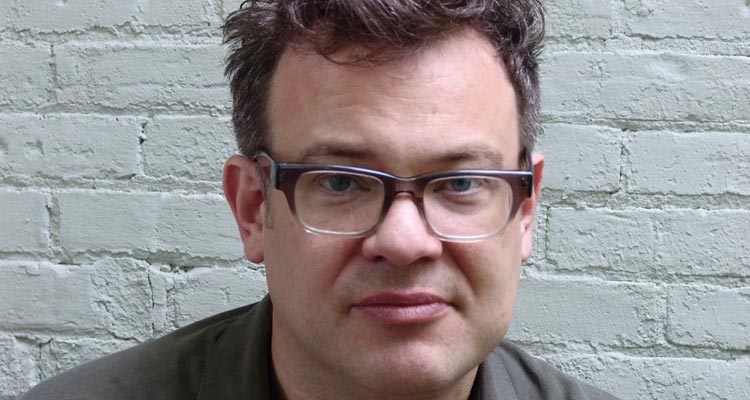When is a poet not like an HVAC repair guy? When are they definitely, finally, maybe freed from the lacy cuffs of Wordsworth and worthy of serious attention—or at least recognition from the mothers of the neighborhood?
Stanza by repetitive word-lust stanza, Matt Cook has shuffled through the grunt work to earn the iota of attention poets get these days, recognized recently in his designation as the city’s poet laureate. Now, Cook has the task of marrying his refreshingly self-effacing and circular thoughts on the problems of the day—from hokey municipal narratives to the classic rock obsession among contractors—in a loose hug that serves to billow the size of the city’s poetry presence.
“It is kind of ridiculous on some level. You’re making an exhibition of yourself [as a poet]. You are,” says Cook over beers at Polish Falcon near his home in Riverwest. “I’m comfortable with it. It’s what I do. I’ve been doing this for so long that it feels like the most natural thing to do.”
Indeed, Cook, 46, puts on a gesticulating, befuddled and wholly engaging show when he reads, as he did in June at the Milwaukee Public Library’s biennial poetry title recognition. Cook read “The Mother Of The Poet,” where a hint of ire floats through the lines on behalf of all artists as he asks why he’s still “trying” to be a poet in the eyes of his mom’s sewing circle, even though no one is so suspicious when they say their son is a heating and cooling technician. In another poem hinting at Milwaukee’s hidden charms, Cook read:
“The bus was moving slowly down the street
All of the passengers were making progress somehow
Nobody riding the bus was a complete failure.
This was in Milwaukee and at one point the driver actually brought the bus to a complete stop to allow for a squirrel to cross the street which truly was an act of refined sophistication not available in the cultural centers.”
Cook may “wring the sponge dry” in banter between poems when he calls some lines “weak tea” (a least-favorite term for his wife, Meredith Root, a local film school grad), but he’s gained accolades that would make an HVAC laureate burn up. Cook’s poems have been notably read by tweed heavyweights Terry Gross and Garrison Keillor; he’s published in the inestimable “United States of Poetry” anthology and, audibly, in a Nike commercial with his riff on Olympic skier Picabo Street (“It was strange … I just didn’t want to be in everyone’s living room.”) Cook’s books have received acclaim and commercial publication—most recently, 2013’s Proving Nothing To Anyone—and he’s had as many touchstones of poetry fame as one probably can nowadays, including a stint under the wing of the Allen Ginsberg, and in flirtations with slam poetry at national competitions in the ’90s.
All the same, part of poetry’s rare corner of the wider art world comes from its distance from the pop culture mainstream. Poetry popularity—and the imaginary cash that comes with it—remains a gripe Cook refutes among colleagues, often before and after regular readings at Woodland Pattern, which he calls “literally the best poetry bookstore in the U.S.”
“It’s so esoteric and unconcerned with being commercial,” Cook says of poetry at large. “It has no real economic dimension to it. That’s what kind of keeps it pure, really.”
Dr. Susan Firer, a previous city laureate, befriended Cook as both crossed academic paths in the UW-Milwaukee Student Union, where they agreed to a promise they both later broke: to “not tell a lot of people” about Milwaukee. During an induction at MPL’s Krug Rare Books Room, Firer defined Cook’s poems as “scanning, recording, and commenting on the contemporary spectacle of metaphysical parking spaces and punk rock coffee houses.”
“Other times, his poems interrogate idioms and phrasing, like the opening of his most recent book, which starts: ‘The dry cleaner calls up and says he’s taking responsibility for my pants,’” Firer assessed and recited.
Cook is almost flustered at the prospect—but not the potential—of what’s next for poetry, especially in Milwaukee. In the fall, the first of about a dozen formal events curated by Cook through the laureate program will kick off in the form of a workshop at the Lynden Sculpture Garden. After he returns from a summer trip to Rome and grimy Naples, Cook will take his next concrete steps past chewing over his extended plans from the laureate handle, which comes with $1,500 a year and a small fund for events. (He teased out a daydream of rejecting a state laureate nomination from Gov. Scott Walker for fear of some sort of poli-literary albatross.) As an ombudsman of sorts on city poetry, Cook sees the possibility of amplifying or even rallying disparate scenes in Milwaukee’s “better than normal” poetry presence. It could involve touching on other circles, like stand-up comedy, which is undergoing its own renaissance and has been a source for Cook’s readings between skit groups in Chicago or before David Cross in Los Angeles. Or it may take jarring a bit of the norm, tilting the complacency of creativity in the Cream City he loves to ruminate on during daily walks up Humboldt Blvd. and Brady St.
“There’s so much more to Milwaukee than cheese and Harley-Davidsons and these corny narratives that are constructed,” Cooks says. “I can’t believe people believe in that stuff. It’s a big city, 600,000 people and it’s a very rich place. I mean, it’s fucked up, there are a lot of problems. I don’t know. Maybe it’s so easy to live here, it can be part of the problem.”

